Configure comparison options
You can use project options to configure the behavior of Schema Compare.
Befor running a schema comparison, you can configure the comparison options on the Options page of the New Schema Comparison wizard. After reviewing the comparison results, you can adjust the options on the Options page of the Change Schema Comparison Properties wizard. The options you set are saved for each project in a *.scomp file.
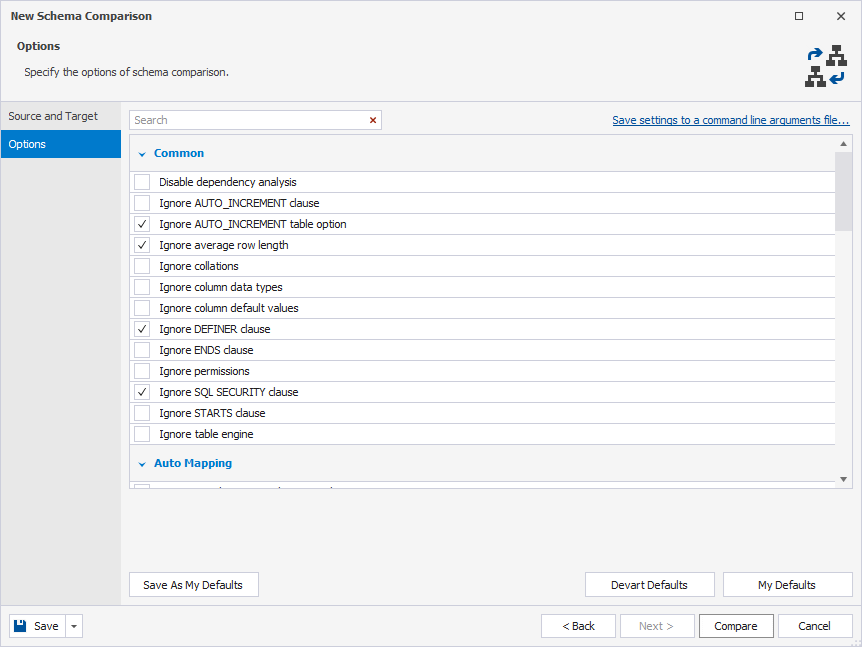
Default options
If you wish to set the current selection of options as your defaults, click Save As My Defaults. These options will be applied to all new projects.
To restore your defaults after making changes, click My Defaults.
To reset all options to their original settings, click Devart Defaults.
Options are conveniently grouped, with detailed descriptions provided for each option.
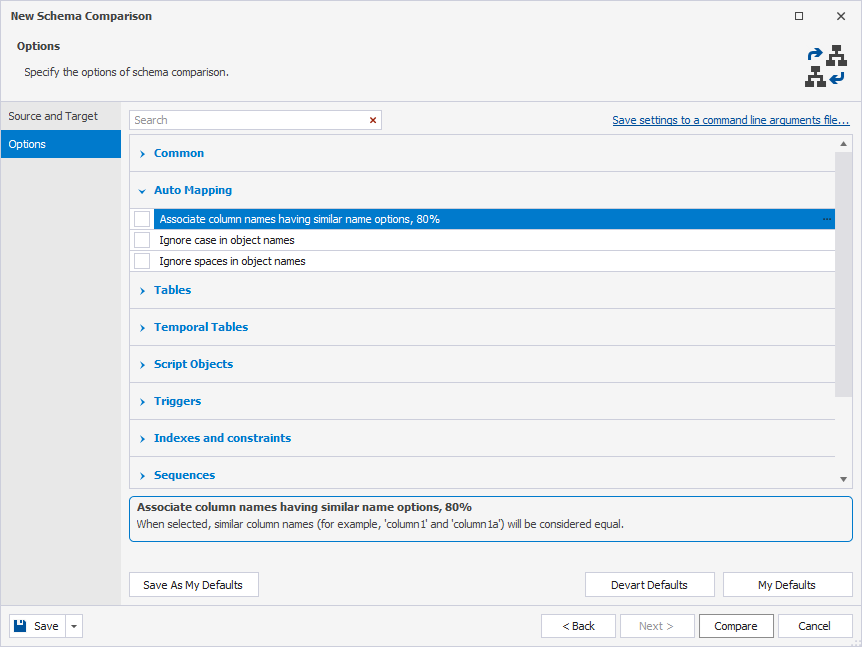
Search for options
On the Options page, you can search for comparison options by typing the search text or symbol, such as a wildcard or an underscore, in the Search box. The list is filtered to display only those options that contain the search text.
The default search mode is case-insensitive. It means that searching for a term like ignore will highlight all options containing the text, regardless of whether they are capitalized (Ignore) or lowercase (ignore). As you type, the text matching your search criteria will be highlighted in the grid. The number of matching options will be displayed in the search bar.
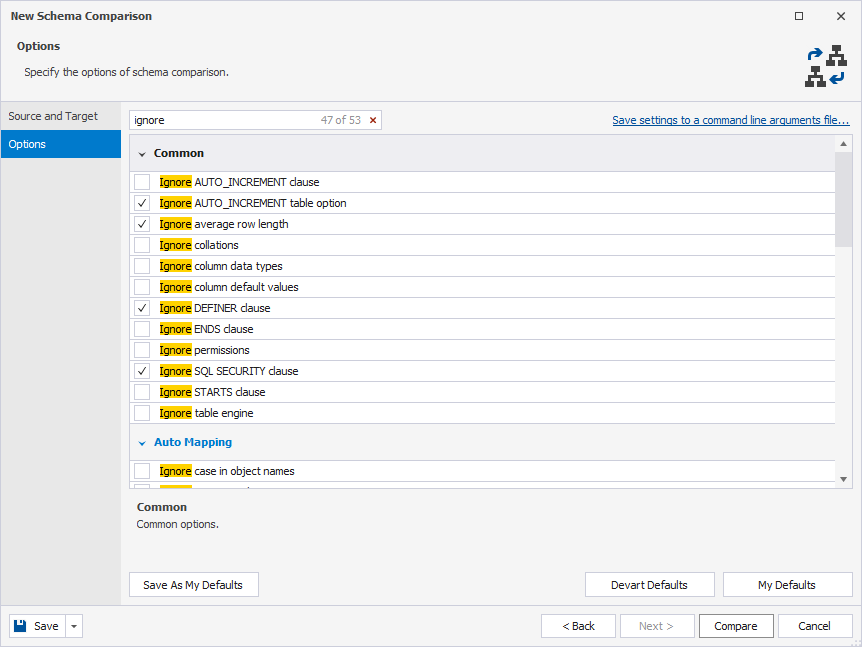
If you enter text separated by spaces, each subsequent input will highlight new results accordingly.
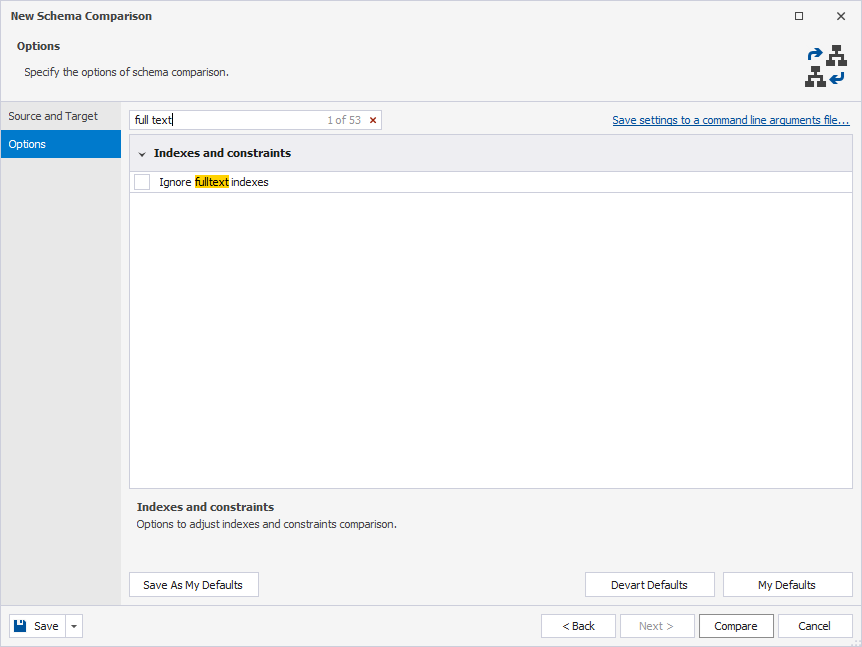
To remove the search input, click ![]() in the Search box.
in the Search box.
Save settings to a command-line arguments file
On the Options page, you can save command-line arguments and settings to a .txt file. To do this, click Save settings to a command-line arguments file.
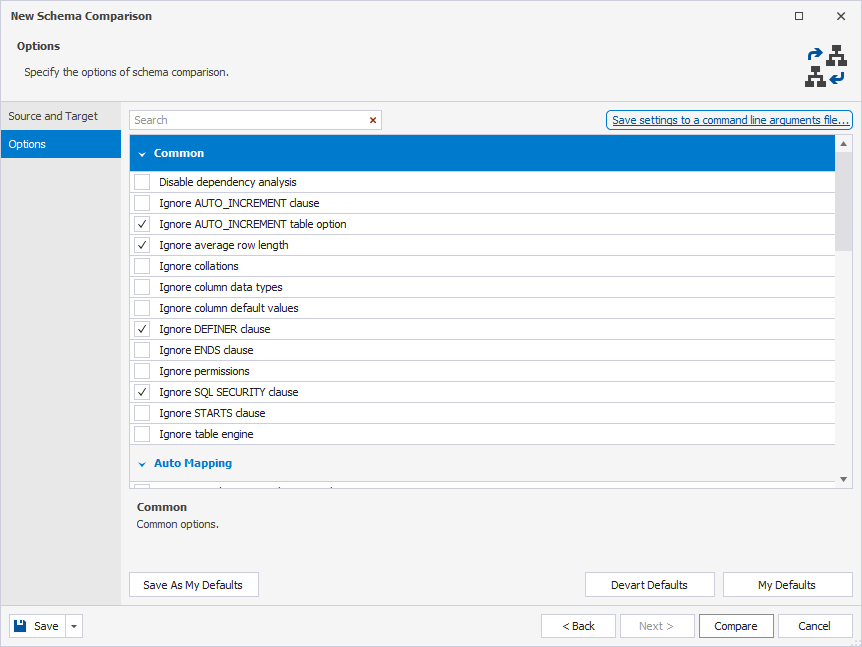
The Save As dialog opens, allowing you to select the destination path to save the file. The default name is SchemaCompareArgs.txt. You can specify a different name and click Save. The file includes information such as the source and target connections, along with a list of comparison options indicating whether each option is turned on (Enabled) or turned off (No):
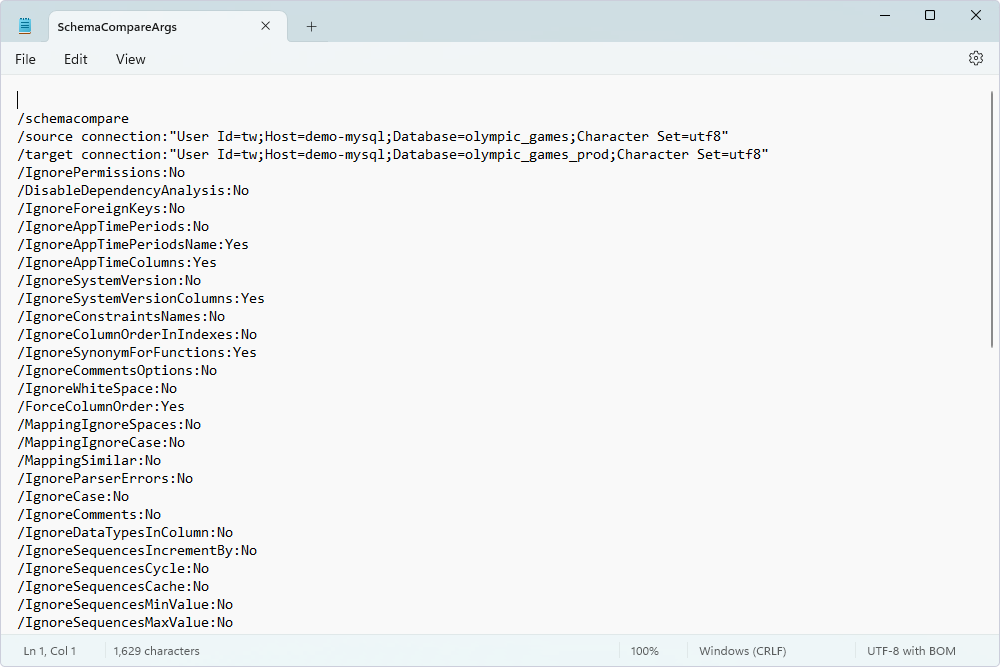
Note
The command-line arguments file includes not only comparison options but also synchronization options.
Schema comparison options
| Option name | Option Group | Default State | Option Description |
|---|---|---|---|
| Disable dependency analysis | Common | Disabled | Disables dependency building algorithms and describes object types selected in the Object filter. |
| Disable AUTO_INCREMENT clause | Common | Disabled | Ignores AUTO_INCREMENT clause in table definition. |
| Disable AUTO_INCREMENT table option | Common | Enabled | Ignores auto increment table option. |
| Ignore average row length | Common | Enabled | Ignores average row length table option. |
| Ignore collations | Common | Disabled | Ignores column collations during the database comparison and synchronization. |
| Ignore column data types | Common | Disabled | Ignores data types during comparison and synchronization. The column data types in the target tables will be preserved if possible. |
| Ignore column default values | Common | Disabled | Ignores column default values during comparison and synchronization. |
| Ignore DEFINER clause | Common | Enabled | Ignores DEFINER clauses for Procedures, Functions, Triggers, Views, and Events during comparison and synchronization. |
| Ignore ENDS clause | Common | Disabled | Ignores ENDS clause in event definition. |
| Ignore permissions | Common | Disabled | Ignores security permissions during comparison and synchronization. Target database permissions will be preserved if possible. |
| Ignore SQL SECURITY clause | Common | Enabled | Ignores SQL SECURITY clause for procedures and views. |
| Ignore STARTS clause | Common | Disabled | Ignores STARTS or AT clauses in event definition. |
| Ignore table engine | Common | Disabled | Ignores table engine. |
| Associate column names having similar name options, 80% | Auto Mapping | Disabled | Considers similar column names (for example, ‘column1’ and ‘column1a’) equal. |
| Ignore case in object names | Auto Mapping | Disabled | Ignores case in object names during comparison and synchronization. |
| Ignore spaces in object names | Auto Mapping | Disabled | Ignores spaces in object names during comparison and synchronization. |
| Force column order | Tables | Enabled | Forces the re-creation of the table when adding new columns to it. |
| Ignore NOT NULL constraint | Tables | Disabled | Ignores the NOT NULL constraint for a column during comparison and synchronization. |
| Ignore partitions | Tables | Disabled | Ignores partitions during comparison. |
| Ignore row format table option | Table | Enabled | Ignores ROW-FORMAT table option during comparison. |
| Ignore application-time periods | Temporal Tables | Disabled | Ignores application-time periods during comparison and synchronization. |
| Ignore application-time period name | Temporal Tables | Enabled | Ignores the names of application-time periods during comparison and synchronization. |
| Ignore application-time period columns | Temporal Tables | Enabled | Ignores the DATE_START and DATE_END columns during comparison and synchronization. |
| Ignore SYSTEM VERSIONING | Temporal Tables | Disabled | Ignores the SYSTEM VERSIONING properties during comparison and synchronization. |
| Ignore system-time period columns | Temporal Tables | Enabled | Ignores the ROW_START and ROW_END columns during comparison and synchronization. |
| Ignore case | Script Objects | Disabled | Ignores case differences in the object’s body during comparison. |
| Ignore COMMENT objects | Script Objects | Disabled | Ignores COMMENT objects during comparison. |
| Ignore comments | Script Objects | Disabled | Ignores comments while comparing stored procedures, views, functions, etc. |
| Ignore synonyms for functions on source objects | Script Objects | Enabled | Ignores the difference between the function names and the names of their synonyms. |
| Ignore white spaces | Script Objects | Disabled | Ignores white spaces (new lines, tabs, spaces, etc.) during comparison and synchronization. Original white spaces in the scripts for database objects and computed columns are preserved. |
| Ignore table DML triggers | Triggers | Disabled | Ignores DML triggers during comparison and synchronization. |
| Ignore firing order for DML triggers | Triggers | Disabled | Ignores trigger fire order. |
| Ignore check constraints | Indexes and constraints | Disabled | Ignores check constraints during comparison and synchronization. |
| Ignore column order in indexes | Indexes and constraints | Disabled | Ignores the included columns order during comparison and synchronization. |
| Ignore constraint names | Indexes and constraints | Disabled | Ignores the constraint names during comparison and synchronization. |
| Ignore foreign keys actions ON UPDATE and ON DELETE | Indexes and constraints | Disabled | Ignores the cascading referential integrity constraints for foreign keys during comparison and synchronization. |
| Ignore fulltext indexes | Indexes and constraints | Disabled | Ignores fulltext indexes during comparison and synchronization. |
| Ignore index names | Indexes and constraints | Disabled | Ignores index names during comparison and synchronization. |
| Ignore indexes | Indexes and constraints | Disabled | Ignores indexes in tables and views during comparison and synchronization. |
| Ignore primary keys | Indexes and constraints | Disabled | Ignores the differences in primary keys during comparison and synchronization. |
| Ignore spatial indexes | Indexes and constraints | Disabled | Ignores spatial indexes during comparison and synchronization. |
| Ignore foreign keys | Indexes and constraints | Disabled | Ignores foreign keys during comparison and synchronization. |
| Ignore CACHE | Sequences | Disabled | Ignores CACHE in sequences during comparison and synchronization. |
| Ignore CYCLE | Sequences | Disabled | Ignores CYCLE in sequences during comparison and synchronization. |
| Ignore INCREMENT BY | Sequences | Disabled | Ignores INCREMENT BY in sequences during comparison and synchronization. |
| Ignore MAXVALUE | Sequences | Disabled | Ignores MAXVALUE in sequences during comparison and synchronization. |
| Ignore MINVALUE | Sequences | Disabled | Ignores MINVALUE in sequences during comparison and synchronization. |
| Ignore START | Sequences | Enabled | Ignores START WITH in sequences during comparison and synchronization. |
| Ignore triggers present only in Target | Keep objects in target | Disabled | Ignores dropped DML triggers in target while comparing and synchronizing tables or views. |
| Ignore indexes present only in target | Keep objects in target | Disabled | Ignores dropped indexes in target while comparing and synchronizing tables or views. |